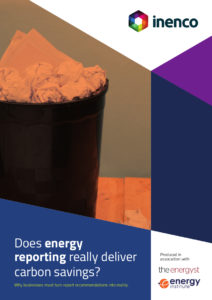 Businesses can unlock genuine benefit by going beyond the compliance aspect of compliance schemes and instead harnessing mandated reporting as a tool for energy, carbon and cost savings.
Businesses can unlock genuine benefit by going beyond the compliance aspect of compliance schemes and instead harnessing mandated reporting as a tool for energy, carbon and cost savings.
Energy reporting is back in the spotlight in 2019, with the new Streamlined Energy and Carbon Reporting (SECR) framework launched in April and Phase 2 of the Energy Savings Opportunity Scheme (Esos) concluding in December. However, new insight reveals that not all businesses are turning data and insight into energy saving actions.
Energy consultancy, Inenco alongside The Energyst and Energy Institute has conducted a survey looking at business attitudes to energy and carbon reporting. Does energy reporting really deliver carbon savings? found that more than eight in ten respondents view CSR as increasingly important or have already embedded it within their business. Yet at the same time six in ten found Esos Phase 1 a waste of time and around half are unprepared for phase 2 or fully understand the requirements of the SECR, a framework which is now live.
Compliance schemes do seem to have had a positive effect regarding awareness, with 82% of respondents saying energy reporting has either raised the profile of energy efficiency or that the organisation already prioritised it. So it seems the message for better managing how we use energy is understood.
However, despite this appreciation of the need to be more energy efficient, there is inertia regarding its implementation. Esos Phase 1 was viewed by 61% of respondents as not being worth it. Correspondingly, the same number of respondents has not acted on their Phase 1 recommendations. Which may explain to some extent why it was not worth it. The audits needed for Esos take time and money and the return is only realised when the energy saving opportunities identified are acted upon.
Tick box exercise or opportunity?
Despite the new framework being ‘streamlined’, business energy professionals have borne a growing reporting burden in the last five years. This has presented challenges from resource constraints to accessing the data required to submit into various schemes.
Bogged down in paperwork, and disheartened by a lack of meaningful outcome, it can be easy to lose sight of the bigger picture. Done correctly and actioned, data and energy saving opportunities identified by energy reporting provide businesses with a wealth of insight to not only reduce carbon emissions, but also cut costs and deliver a significant boost to both CSR credentials and, crucially, the bottom line.
“Businesses are mistaken if they pigeonhole legal reporting obligations such as Esos and SECR as a compliance issue. They’re about opportunity,” comments Nick Turton, External Affairs Director, Energy Institute.
Those engaged in Esos Phase 2 should therefore redouble efforts to emphasise the opportunity aspect, according to Inenco’s Esos Solutions Programme Leader Rui Zu. Robust, accurate data should help encourage meaningful action, he suggests.
“Energy reporting is the foundation for compliance, by offering businesses a true picture of their energy consumption, costs and carbon emissions. However, the benefits of the reporting are only realised when organisations utilise the data and turn it into insight and actions,” says Zu.
“The results of this survey show that nearly two thirds of businesses haven’t capitalised on the opportunities made available to them through Esos Phase 1, undoubtedly impacting their cost base and competitiveness. It is also concerning that 54% of businesses have not yet commenced their Phase 2 assessments.
“Businesses should really utilise their energy compliance work to rethink how they can cut energy costs and improve their competitiveness.”
To help businesses drive action from their audits, the report provides insight and advice based on 320 Esos Phase 1 audits conducted by Inenco. For those looking to gain a deeper understanding of energy saving opportunities and the changing framework for energy and carbon reporting, we think this is essential reading.
 Does energy reporting really deliver carbon savings? can be downloaded here.
Does energy reporting really deliver carbon savings? can be downloaded here.
To understand why businesses might be inhibited from acting on their report recommendations, Inenco, The Energyst and Energy Institute surveyed energy professionals in businesses affected by Esos and SECR during February / March 2019.
The report’s findings will be discussed in a dedicated session, ‘From tick box to toolbox’ at The Energyst Event on 2ndMay.
Speakers will outline optimal approaches to energy reporting compliance.To register for the event click here.




One way to ensure that ESOS recommendations are implemented is simply to require companies to provide the subsequent auditor with a detailed explanation, regarding why any ( by definition ) cost- effective investments have not been undertake..
After all, that is precisely what financial auditors expect.to, and do , get. So why don’t energy auditors demand the same levels of response?